🦴🔥💊 Piroxicam 20mg Tablet: Long-Acting NSAID for Pain, Inflammation & Joint Disorders
Piroxicam 20mg is a nonsteroidal anti-inflammatory drug (NSAID) used for the relief of pain, inflammation, and stiffness associated with various musculoskeletal and joint disorders. As a long-acting NSAID, it is commonly prescribed for arthritis, back pain, muscle strains, and postoperative discomfort. Its once-daily dosing makes it convenient for chronic conditions like osteoarthritis and rheumatoid arthritis, offering sustained symptom control.
🔬 Mechanism of Action
Piroxicam works by inhibiting cyclooxygenase enzymes (COX-1 and COX-2), which are responsible for the synthesis of prostaglandins—chemical mediators involved in pain, inflammation, and fever.
Key effects include:
-
Reduction of inflammation
-
Pain relief
-
Lowering of joint swelling and stiffness
-
Fever reduction (less common use)
Unlike short-acting NSAIDs, Piroxicam has a long half-life (about 50 hours), allowing for once-daily administration.
📌 Indications and Uses
Piroxicam 20mg is used in the management of:
-
Osteoarthritis – reduces joint pain and improves mobility
-
Rheumatoid arthritis – alleviates chronic joint inflammation and swelling
-
Ankylosing spondylitis – relieves spinal stiffness and discomfort
-
Musculoskeletal pain – including sprains, strains, and back pain
-
Postoperative or dental pain
-
Gout (acute attacks) – off-label use
It is especially beneficial in chronic inflammatory conditions requiring long-term pain management.
💊 Dosage and Administration
-
Typical adult dose: 20mg once daily
-
In some cases, 10mg twice daily may be used to minimize gastrointestinal side effects
-
Should be taken with food or milk to reduce gastric irritation
-
Duration of use should be as short as possible based on clinical need
⚠️ Precautions and Warnings
-
Not recommended for long-term use without monitoring due to gastrointestinal, renal, and cardiovascular risks
-
Contraindicated in:
-
Peptic ulcer disease
-
Gastrointestinal bleeding
-
Severe heart, liver, or kidney impairment
-
Asthma triggered by NSAIDs
-
-
Use with caution in:
-
Elderly patients
-
Those with a history of hypertension or heart disease
-
-
Avoid combining with other NSAIDs or blood thinners unless advised
Routine monitoring may include:
-
Kidney function tests
-
Liver function
-
Blood pressure
-
Complete blood count for signs of bleeding or anemia
🤒 Side Effects
Common:
-
Nausea, vomiting
-
Stomach pain or indigestion
-
Headache or dizziness
-
Diarrhea or constipation
Serious:
-
Gastrointestinal bleeding or ulceration
-
Kidney dysfunction
-
Hypertension or fluid retention
-
Allergic reactions (rash, itching, anaphylaxis)
Seek urgent care for symptoms like black stools, vomiting blood, severe abdominal pain, or difficulty breathing.
🔄 Drug Interactions
-
Increased risk of bleeding with:
-
Aspirin
-
Warfarin or other anticoagulants
-
-
May reduce the effectiveness of:
-
Antihypertensives (ACE inhibitors, diuretics)
-
-
Use cautiously with methotrexate, lithium, or corticosteroids
🧊 Storage Instructions
-
Store below 25°C, in a dry place
-
Keep away from heat, light, and moisture
-
Keep out of reach of children
📝 Conclusion
Piroxicam 20mg tablet is a potent, long-acting NSAID ideal for managing chronic inflammatory conditions like arthritis. Its once-daily dosing offers convenience and consistent relief, but it must be used with caution due to potential gastrointestinal and cardiovascular side effects. Under proper medical guidance, it provides effective, long-lasting pain control and improves quality of life in patients with joint and musculoskeletal disorders.
Note: This information is intended for educational purposes and should not replace professional medical advice. Always consult your healthcare provider for personalized recommendations.
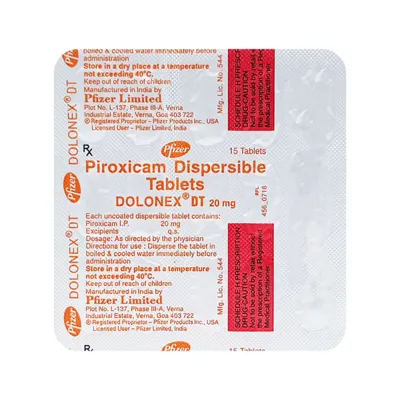

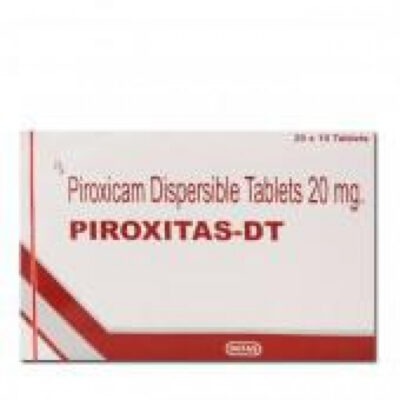
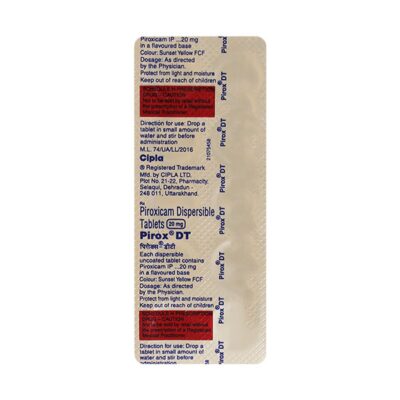
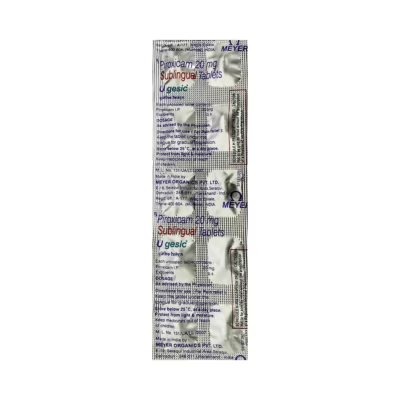
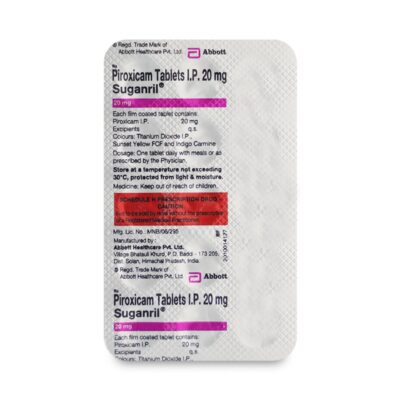
Reviews
There are no reviews yet.